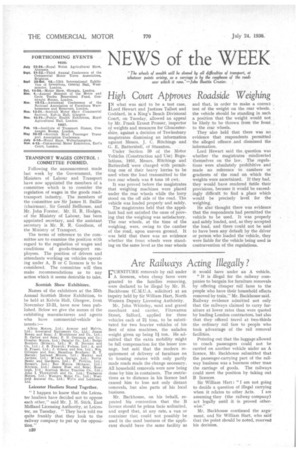Are Railways Acting illegally ?
Page 34

If you've noticed an error in this article please click here to report it so we can fix it.
CURNITURE removals by rail under
A licences, when cheap fares were granted to the families removing, were declared to be illegal by Mr. H. Backhouse -(C.M.U.A. solicitor) at an inquiry held by Sir William Hart, North Western Deputy Licensing A.uthOrity.
Mr. John Whiteley, sand and gravel merchant and carrier, Fitzwarren Street, Salford, applied for three vehicles each of 21 tons, to be substituted for two heavier vehicles of his fleet of nine machines, the unladen weight given up being 11 ton. He admitted that the extra mobility might he full compensation for the lesser tonnage, but said that the modern requirement of delivery of furniture on to housing estates with only partly made roads made the change necessary. All household removals were now being done by him in containers. The restrictions as to distance in his licence bad caused him to lose not only distant removals, but also parts of his local business.
Mr. Backhouse, on his behalf, repeated his contention that the B licence should be prima facie unlimited, and urged that, at any rate, a van or container that could not possibly be used in the.t sand business of the applicant should have the same facility as it would have under an A vehicle, " It is illegal for the railway companies to bargain for furniture removals by offering cheaper rail fares to the people who have their household effects removed by train," Mr. Backhouse said. Railway evidence admitted not only that the railways claimed to carry furniture at lower rates than were quoted by leading London contractors, but also that they offered travel at two-thirds the ordinary rail fare to people who took advantage of the rail removal facilities.
Pointing out that the luggage allowed to coach passengers could not be carried on another vehicle under an A licence, Mr. Backhouse submitted that the passenger-carrying part of the railway business was a business other than the carriage of goods. The railways could meet the position by taking out B licences.
Sir William Hart : " I am not going to decide a question of illegal carrying when it relates to other Acts. I am assuming they (the railway company) act legally until it is proved otherwise."
Mr. Backhouse continued the argtimerit, and Sir William Hart, who said that the point should be noted, reserved his decision.




























































































